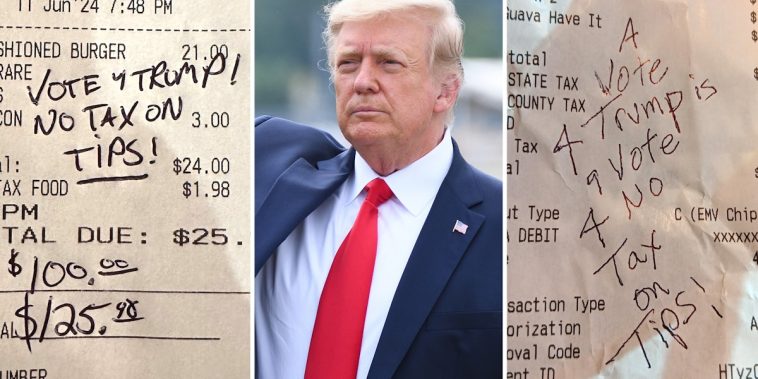Vice President Kamala Harris recently sparked surprise inside her party when she echoed a stance previously held by former President Donald Trump. Harris presented her ‘no tax on tips’ plan for service industry and hospitality workers during a gathering in Las Vegas, promising to fight for the American working family’s wages and tip-tax exemption – an announcement that left many in the Democratic party blindsided. This announcement came barely a month after Trump made a similar declaration, an idea some leading Democrats had previously dismissed as a ‘nonsensical’ election-season tactic, according to reports from The Hill.
One of the cornerstone promises Harris conveyed to her followers last weekend was the assurance that, if she were to hold the presidency, the fight for the cause of American working families would persist. Part of this fight would be a push for an increase in the minimum wage and the barring of taxes on tip income for service and hospitality professionals. This proposal, intriguingly, closely mirrored that made by Trump at a Las Vegas rally on June 9.
Following Trump’s initial suggestion to abolish tip taxation for service workers, strong reactions emerged among prominent Democrats. These included the likes of Senate Finance Committee Chair Ron Wyden, Senate Finance Committee member Debbie Stabenow, and veteran member of the House Ways and Means Committee Rep. Lloyd Doggett, all of whom were outspoken in their criticism of the Republican nominee’s plan. In particular, Wyden had lambasted Trump’s suggestion as a ‘nonsensical proposal’ and tagged it an ‘election-year ploy’.
The unexpected turn of events was when the Democratic ticket found their own nominee endorsing that very promise which, only a few weeks ago, they deemed manipulative and hollow. This sudden alignment in policy approach between Harris and Trump on the ‘no tax on tips’ issue has brought a wave of surprise and concern within the party, with some worrying over potential impacts on wage structures.
Some progressives have voiced apprehension that this kind of policy could inadvertently encourage companies to dodge pay hikes, triggering increased reliance on customer gratuities. Hinting at this concern, a senior Senate Democrat aide confessed to an unforeseen development, admitting he hadn’t anticipated Harris advocating for the tipped-wage solution. He further stated not considering it substantiated when initially proposed by Trump, or even now.
Steven Rosenthal, a seasoned expert at the Tax Policy Center, shared a similar view. Rosenthal said, ‘The ‘no tax on tips’ idea proposed by Trump in June did face substantial opposition, especially from the liberal side. Harris’s endorsement of essentially the same proposal was certainly unexpected.’.
‘I have always been a fair observer, assessing the scenarios as they are,’ Rosenthal continued. ‘Both the ‘no tax on tips’ proposals from Trump and Harris do not resonate as sound policy to me.’. Despite the stance of prominent Democrats previously labeling such a policy inadequate, the reappearance of it from their own side has left many baffled.
In an interesting twist early this week, White House Press Secretary Karine Jean-Pierre revealed that President Joe Biden also backs the idea of tip tax relief for service workers. She stated, ‘This elimination of taxes on tips is a policy President Biden is supporting. In addition to fighting for higher minimum pay rates and thwarting immoderate wealth accumulation in the hands of the few.’
Jean-Pierre’s revelation led to a flurry of questions from the press, asking if Harris was borrowing heavily from Trump’s policy playbook. The Press Secretary deftly diverted the question by saying, ‘I won’t comment on any ideologies of presidential candidates. They have their campaigns to speak for them. What I can firmly assert is that this President and Vice President have always been allies of the working class, as displayed by their proposed policies.’
Former President Trump wasn’t shy in voicing his opinions following the similar promises from the Democratic side. Trump openly criticized Harris, accusing her of deceit and predicting a quick reversal of her stance. He declared, ‘She is misleading the American citizens, and she will swiftly revert.’
Despite the criticism, Trump’s next statement leaned towards a familiar campaign slogan, promising dedication to the homeland, ‘I will MAKE AMERICA GREAT AGAIN! There will be no reversals on my watch!!!’. The bold emphasis on consistency could be seen as an attempt to highlight the idea of principled, unwavering leadership.
However, it’s noteworthy that the discussion has spurred thought pertaining to the authenticity of pledge making and following through. At its core, it raises the question of whether high-stakes promises should be viewed with a skeptical eye, taking into account the twists and turns of the political landscape.
Yet, one must remember: Even if these promises may seem sudden or out of character, they may hold significant potential to impact sectors like the service and hospitality industry. Working families stand to gain considerably if these initiatives are implemented and managed successfully. Hence, with careful observation and grounded expectation, the public awaits developments.
Over the years, tax revision has consistently proven to be a complex issue, involving a multitude of factors. It’s clear that proposing a policy and successfully implementing it are two vastly different challenges. This reality inevitably throws into question the viability of a revised tax plan on service industry tips.
Whether it’s Trump’s proposed plan or the similar folds emerging from the Democratic side, an eventual execution would require thorough planning, consideration of potential impacts, and above all, consistence in the political will to effect change. Until then, the Americans at the receiving end continue to hope for the best while preparing for the grind of day-to-day economic realities.


